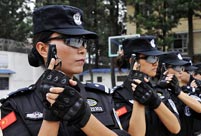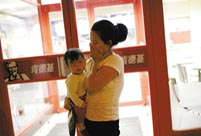 China's new-type guided missile frigate 'Bengbu' in live fire training
China's new-type guided missile frigate 'Bengbu' in live fire training
 China’s weekly story (2013.8.10 - 8.23)
China’s weekly story (2013.8.10 - 8.23)
 Flight team performs first show abroad
Flight team performs first show abroad
 With parents bedridden, 12-year-old boy becomes pillar of the family
With parents bedridden, 12-year-old boy becomes pillar of the family
 Top 10 private Chinese enterprises 2013
Top 10 private Chinese enterprises 2013
 The most gorgeous Chinese women in the eyes of foreigners
The most gorgeous Chinese women in the eyes of foreigners
A slew of child injuries and deaths have prompted China, a land of the single children, to keep kids safer through legislation, government intervention and promotion of public awareness of minors' safety.
The majority of Chinese families, particularly in cities, are allowed to have only one child, yet children frequently die, get injured or abducted as a result of their guardians' neglect.
In one of the latest and most appalling cases, a rural boy in north China's Shanxi Province had his eyes gouged out by a woman, whom police have identified as his paternal aunt, when he was playing alone outside his home on Aug. 24.
The 6-year-old has permanently lost his sight while the suspect committed suicide on Aug. 30.
In late June, two girls, aged five and seven, died after falling from their rented apartment in China's largest city Shanghai. They were home alone as their parents were busy at the family-run restaurant nearby.
The tragedy happened just a week after two toddlers were found to have starved to death in Nanjing, capital of east China's Jiangsu Province, after their drug addict mother abandoned them. Their father was serving a jail term for drug offenses.
In what is seen as the most bizarre case, in March, a two-month-old baby was left alone by his father in the family SUV in Changchun, capital of northeast China's Jilin Province. A thief stole the vehicle and strangled the baby to death.
Child safety specialists believe such tragedies could be prevented if parents kept a closer eye on their children, and, if unattended children had been detected sooner.
LEGAL FLAWS
"Serious child injuries caused by caregivers' neglect are on the rise these days. But our law has a blind spot on this issue," said Qin Qianhong, a law professor with Wuhan University in central China's Hubei Province.
The newly revised minors' protection law that took effect this year states in general that parents or other custodians shall "learn about home education and perform their duty properly", but fails to define their responsibilities, according to Prof. Qin.
"Laws should be made to clarify what guardians have to do - to stipulate, for example, that they cannot leave children under a certain age unattended," Qin said.
"Personally I think children shouldn't be left to care for themselves until 12, when they're fully able to recognize and respond to danger," he added.
Legal commentator Fu Dalin said the provision in the minors' protection law that allows removal of guardianship by courts in case of dereliction of duty needs more detail to become workable.
"The article doesn't specify who can petition for such removal, in what situations the removal should be filed for, and what would happen to the child after the change of guardianship," said Fu.
Jolanda Van Westering, Chief of Child Protection with UNICEF (United Nations Children's Fund) China, believes that besides guardianship and emergency removal of custody, the duty of the state to protect children from harms such as neglect, maltreatment and sexual abuse should also be stipulated in the law.
The various roles, responsibilities and mandates of State Departments in the field are not clear and need to be laid down in legislation, said the official.
"There can be some basic duties of caregivers in laws, but that needs to be balanced with the duty of the state, which should enable parents to protect their children," Van Westering said, referring to parents who have difficulty in handling various forms of stress in life and therefore fail to take good care of their children.
She added that responsibilities of health and education workers as first responders in child protection should also be laid out by law.
CONCERTED EFFORTS
However, legislation is apparently not a panacea ensuring child safety.
"For instance, many low-income parents would be unable to pay household expenses if they take care of their children at the expense of their job. No doubt the burden should be shared by the government," said Wu Dahua, head of the Guizhou Academy of Social Sciences.
Echoing Wu's view, Prof. Qin suggested the government finance community-based care centers across the country, especially in underdeveloped regions.
In fact, the issue is already on the Chinese government's agenda, as the National Plan of Action for Children issued in 2011 set the goal of building a child care center in 90 percent of communities nationwide by 2020.
UNICEF took the lead by launching the Child Friendly Space (CFS) project in 2008, which has been rapidly expanded with the government's active engagement, according to Van Westering.
The CFS provides children with a safe place to play, to know each other and to have early childhood education, she said, adding the 21 UNICEF-funded centers in 10 provinces had benefited 300,000 children.
"As the project expanded with UNICEF's technical support, it has evolved into child protection and intervention," Van Westering said.
Trained volunteers in the CFS are able to detect problems the children face, such as neglect and abuse, and refer them and their family to proper social assistance and welfare services, she explained.
In addition, the volunteers offer outreach services including home visits and parenting training, the only two interventions that have been proven globally to directly reduce the risk of child maltreatment, she said.
Van Westering stressed the importance of awareness-raising activities among parents and the community in promoting child protection.
"Contrary to what many believe, most child abuse is committed not by strangers, but by people known to the child, including parents, relatives, teachers, neighbors or friends of the family," she said.
Besides UNICEF's intervention, the Chinese government has also launched its own initiatives to better protect children.
In May, the Ministry of Civil Affairs ordered 20 pilot regions across the country to build community-based safety nets for vulnerable minors, specifically vagrants, school dropouts and those left unattended.
The regions were also required to set up an effective mechanism to detect, report and respond to injuries to children.
Beijing, one of the pilot cities, has moved to make the emergency removal of guardianship more practicable in Chaoyang, Fengtai and the outer Miyun districts.
In these three districts, incompetent or abusive guardians who refuse to improve their attitude and behaviors can be deprived of custody by courts, according to a circular issued by Beijing's municipal bureau of civil affairs on Aug. 7.
The bureau's community branches, known as neighborhood committees in urban areas and village committees in the countryside, will help the children apply for such removals, the circular said.
The children will then be placed temporarily under the guardianship of child protection organizations before their new guardians are designated, it said.
In a latest development, Beijing's civil affairs bureau is bidding for social services to help protect children's rights.
Social organizations are encouraged to apply for the government purchased minors protection projects, with a maximum budget of 300,000 yuan each, to provide shelter and counseling services to children at risk, according to a circular issued by the bureau on Monday.
A slew of child injuries and deaths have prompted China, a land of the single children, to keep kids safer through legislation, government intervention and promotion of public awareness of minors' safety.
The majority of Chinese families, particularly in cities, are allowed to have only one child, yet children frequently die, get injured or abducted as a result of their guardians' neglect.
In one of the latest and most appalling cases, a rural boy in north China's Shanxi Province had his eyes gouged out by a woman, whom police have identified as his paternal aunt, when he was playing alone outside his home on Aug. 24.
The 6-year-old has permanently lost his sight while the suspect committed suicide on Aug. 30.
In late June, two girls, aged five and seven, died after falling from their rented apartment in China's largest city Shanghai. They were home alone as their parents were busy at the family-run restaurant nearby.
The tragedy happened just a week after two toddlers were found to have starved to death in Nanjing, capital of east China's Jiangsu Province, after their drug addict mother abandoned them. Their father was serving a jail term for drug offenses.
In what is seen as the most bizarre case, in March, a two-month-old baby was left alone by his father in the family SUV in Changchun, capital of northeast China's Jilin Province. A thief stole the vehicle and strangled the baby to death.
Child safety specialists believe such tragedies could be prevented if parents kept a closer eye on their children, and, if unattended children had been detected sooner.
LEGAL FLAWS
"Serious child injuries caused by caregivers' neglect are on the rise these days. But our law has a blind spot on this issue," said Qin Qianhong, a law professor with Wuhan University in central China's Hubei Province.
The newly revised minors' protection law that took effect this year states in general that parents or other custodians shall "learn about home education and perform their duty properly", but fails to define their responsibilities, according to Prof. Qin.
"Laws should be made to clarify what guardians have to do - to stipulate, for example, that they cannot leave children under a certain age unattended," Qin said.
"Personally I think children shouldn't be left to care for themselves until 12, when they're fully able to recognize and respond to danger," he added.
Legal commentator Fu Dalin said the provision in the minors' protection law that allows removal of guardianship by courts in case of dereliction of duty needs more detail to become workable.
"The article doesn't specify who can petition for such removal, in what situations the removal should be filed for, and what would happen to the child after the change of guardianship," said Fu.
Jolanda Van Westering, Chief of Child Protection with UNICEF (United Nations Children's Fund) China, believes that besides guardianship and emergency removal of custody, the duty of the state to protect children from harms such as neglect, maltreatment and sexual abuse should also be stipulated in the law.
The various roles, responsibilities and mandates of State Departments in the field are not clear and need to be laid down in legislation, said the official.
"There can be some basic duties of caregivers in laws, but that needs to be balanced with the duty of the state, which should enable parents to protect their children," Van Westering said, referring to parents who have difficulty in handling various forms of stress in life and therefore fail to take good care of their children.
She added that responsibilities of health and education workers as first responders in child protection should also be laid out by law.
CONCERTED EFFORTS
However, legislation is apparently not a panacea ensuring child safety.
"For instance, many low-income parents would be unable to pay household expenses if they take care of their children at the expense of their job. No doubt the burden should be shared by the government," said Wu Dahua, head of the Guizhou Academy of Social Sciences.
Echoing Wu's view, Prof. Qin suggested the government finance community-based care centers across the country, especially in underdeveloped regions.
In fact, the issue is already on the Chinese government's agenda, as the National Plan of Action for Children issued in 2011 set the goal of building a child care center in 90 percent of communities nationwide by 2020.
UNICEF took the lead by launching the Child Friendly Space (CFS) project in 2008, which has been rapidly expanded with the government's active engagement, according to Van Westering.
The CFS provides children with a safe place to play, to know each other and to have early childhood education, she said, adding the 21 UNICEF-funded centers in 10 provinces had benefited 300,000 children.
"As the project expanded with UNICEF's technical support, it has evolved into child protection and intervention," Van Westering said.
Trained volunteers in the CFS are able to detect problems the children face, such as neglect and abuse, and refer them and their family to proper social assistance and welfare services, she explained.
In addition, the volunteers offer outreach services including home visits and parenting training, the only two interventions that have been proven globally to directly reduce the risk of child maltreatment, she said.
Van Westering stressed the importance of awareness-raising activities among parents and the community in promoting child protection.
"Contrary to what many believe, most child abuse is committed not by strangers, but by people known to the child, including parents, relatives, teachers, neighbors or friends of the family," she said.
Besides UNICEF's intervention, the Chinese government has also launched its own initiatives to better protect children.
In May, the Ministry of Civil Affairs ordered 20 pilot regions across the country to build community-based safety nets for vulnerable minors, specifically vagrants, school dropouts and those left unattended.
The regions were also required to set up an effective mechanism to detect, report and respond to injuries to children.
Beijing, one of the pilot cities, has moved to make the emergency removal of guardianship more practicable in Chaoyang, Fengtai and the outer Miyun districts.
In these three districts, incompetent or abusive guardians who refuse to improve their attitude and behaviors can be deprived of custody by courts, according to a circular issued by Beijing's municipal bureau of civil affairs on Aug. 7.
The bureau's community branches, known as neighborhood committees in urban areas and village committees in the countryside, will help the children apply for such removals, the circular said.
The children will then be placed temporarily under the guardianship of child protection organizations before their new guardians are designated, it said.
In a latest development, Beijing's civil affairs bureau is bidding for social services to help protect children's rights.
Social organizations are encouraged to apply for the government purchased minors protection projects, with a maximum budget of 300,000 yuan each, to provide shelter and counseling services to children at risk, according to a circular issued by the bureau on Monday.
RURAL PROBLEM
Van Westering noted child maltreatment happens in all strata of society, rich and poor, urban and rural.
Nevertheless, the vast number of migrant workers in China may find special difficulties in raising a child, as they see themselves as forced to leave the care of their children to elderly grandparents or other relatives.
One fifth of the country's children, or 61 million, are left behind in rural areas as their parents move to cities in search of work, according to the statistics released by the All-China Women's Federation in May.
The children living with their grandparents, many in poor health, are at significant risk from drowning, poisoning, traffic accidents, fires, physical attacks and sexual assaults, according to Wang Kaiyu, a sociologist with Anhui Provincial Academy of Social Sciences.
Since June, more than 20 rural children have been reportedly drowned in a number of provinces, most of whom were left behind by their parents.
"A major factor behind the safety risk is lack of adequate supervision", said Wang, who conducted field investigations on the issue in Anhui, Zhejiang and Jiangsu provinces.
Chen Shuai, a teacher at a rural primary school in Anhui's Yingshang County, said "Our students meet their parents only once or twice a year. When their parents call home, they always remind the kids to work hard, but care little about their safety."
To reduce the safety risk the "left-behind" children are facing, the local government is building playrooms for them.
Wang believes the best solution lies in helping these parents reunite with their children.
On the one hand, the government should loosen the household registration system that cuts migrant workers and their children out of housing, education, medical care and other benefits in cities, he said.
"On the other hand, it should speed up urbanization so as to create more jobs for rural parents right in their hometown," he said. Enditem
Van Westering noted child maltreatment happens in all strata of society, rich and poor, urban and rural.
Nevertheless, the vast number of migrant workers in China may find special difficulties in raising a child, as they see themselves as forced to leave the care of their children to elderly grandparents or other relatives.
One fifth of the country's children, or 61 million, are left behind in rural areas as their parents move to cities in search of work, according to the statistics released by the All-China Women's Federation in May.
The children living with their grandparents, many in poor health, are at significant risk from drowning, poisoning, traffic accidents, fires, physical attacks and sexual assaults, according to Wang Kaiyu, a sociologist with Anhui Provincial Academy of Social Sciences.
Since June, more than 20 rural children have been reportedly drowned in a number of provinces, most of whom were left behind by their parents.
"A major factor behind the safety risk is lack of adequate supervision", said Wang, who conducted field investigations on the issue in Anhui, Zhejiang and Jiangsu provinces.
Chen Shuai, a teacher at a rural primary school in Anhui's Yingshang County, said "Our students meet their parents only once or twice a year. When their parents call home, they always remind the kids to work hard, but care little about their safety."
To reduce the safety risk the "left-behind" children are facing, the local government is building playrooms for them.
Wang believes the best solution lies in helping these parents reunite with their children.
On the one hand, the government should loosen the household registration system that cuts migrant workers and their children out of housing, education, medical care and other benefits in cities, he said.
"On the other hand, it should speed up urbanization so as to create more jobs for rural parents right in their hometown," he said.
 Mexican president delivers first State of Nation address
Mexican president delivers first State of Nation address Highlights of MAKS 2013 Int'l Aviation and Space Show
Highlights of MAKS 2013 Int'l Aviation and Space Show  10th China-ASEAN Expo opens in Nanning
10th China-ASEAN Expo opens in Nanning Baby born to save his sister - the story of a savior sibling
Baby born to save his sister - the story of a savior sibling Lady of mystery: Female SWAT team in prison disclosed
Lady of mystery: Female SWAT team in prison disclosed  Single mother, baby live in KFC restaurant for months
Single mother, baby live in KFC restaurant for months Top 10 naked hotels in the world
Top 10 naked hotels in the world The most gorgeous Chinese women in the eyes of foreigners
The most gorgeous Chinese women in the eyes of foreigners A collection of bizarre rooftop buildings around China
A collection of bizarre rooftop buildings around China Putin intimate contacts with marine animals
Putin intimate contacts with marine animals China's frigate 'Bengbu'in fire training
China's frigate 'Bengbu'in fire training Fresh students 'forced' to register in university independently
Fresh students 'forced' to register in university independently 2013 Taiwan Int'l Tourism Expo kicks off in Taipei
2013 Taiwan Int'l Tourism Expo kicks off in Taipei Photo story: Take a gap year
Photo story: Take a gap year Nokia's Global Headquarters: visiting a declining empire
Nokia's Global Headquarters: visiting a declining empireDay|Week|Month